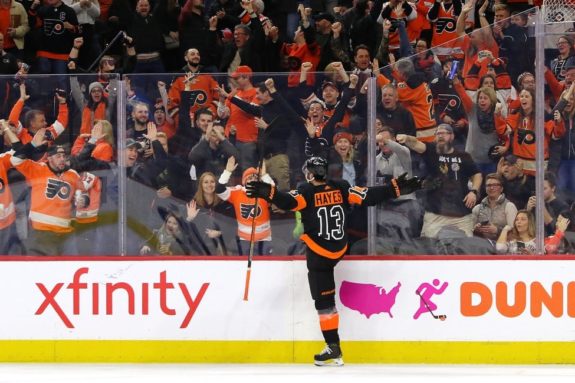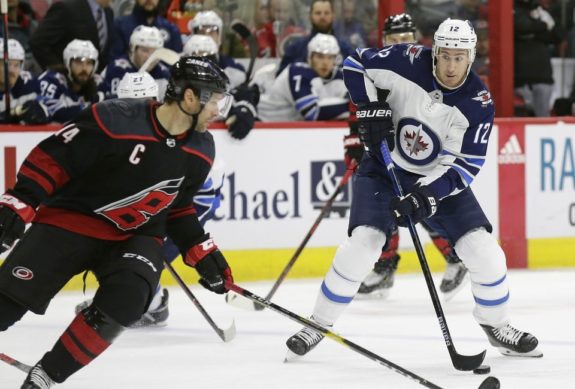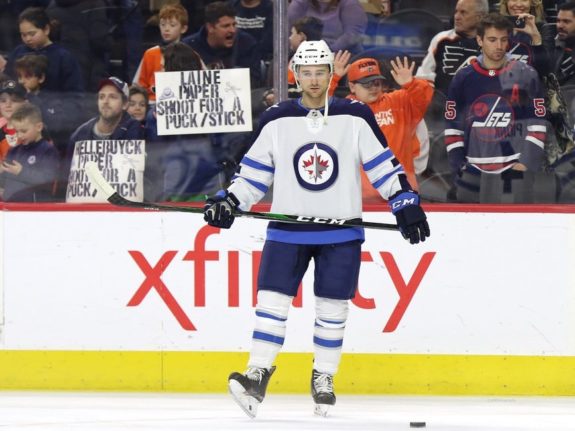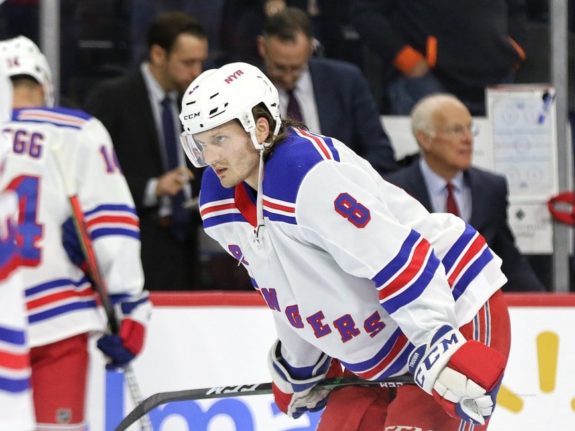After spending five seasons in a New York Rangers’ uniform, Kevin Hayes was traded to the Winnipeg Jets on February 25, 2019. Hayes, a pending free agent at the time, was sent to Manitoba in exchange for Winnipeg’s 2019 first-round pick, bottom-six forward Brendan Lemieux, and a conditional fourth-round draft pick in 2022.
Related: Best & Worst Trades in Winnipeg Jets’ History
The addition of Hayes saw the Jets immediately improve their depth down the middle and solidified their “win now” mentality, as they prepared for the postseason. At the time, Winnipeg boasted one of the best top-nine forward groups, as Hayes complemented both Mark Scheifele and Bryan Little.
What Did Hayes Bring?
It’s no debate that Hayes undoubtedly made the Jets better. Posting a respectable 13 points in the final 20 regular-season games while also chipping in with three points in the playoffs, Hayes made an effective impact during his short tenure north of the border.

With that being said, however, Hayes alone couldn’t fix the problems that the Jets were having late in the season. Finishing with a dismal 2-4-1 record in their final seven games, the Jets limped into the playoffs and continued to struggle, eventually surrendering to the eventual Stanley Cup champion St. Louis Blues in six games.
While Hayes did bring added depth and key secondary scoring abilities, overall, the Jets struggled mightily in the third period. Their failure to close out games was blatantly evident against St. Louis, which saw them squander late-game leads in Games 1 and 5, while also losing after entering the third period tied in Game 2.

Scoring won’t fix a problem like that.
Following their early playoff exit, the Jets promptly traded Hayes’ negotiating rights to Philadelphia in exchange for a 2019 fifth-round pick. Less than 20 days after the trade, Hayes signed a seven-year, $50 million extension with the Flyers and is currently enjoying his first season in the City of Brotherly Love.
The Return of the First-Round Pick
When the Jets traded Hayes to Philly for a late-round pick, the former deadline acquisition looked like a failure. However, a day before Hayes signed his massive extension, the Jets re-acquired their first-round pick from New York (which was the focal point of the Hayes deal) as part of a package with Neal Pionk, in exchange for defenceman Jacob Trouba – a trade that so far has been paying massive dividends for Winnipeg.
Related: Jets Should Target Travis Hamonic
Pionk, who had only seen limited ice-time while with the Rangers, has blossomed into a high-calibre, top-four defenceman, as his point totals have nearly doubled compared to last season. He has flourished on a Jets team in desperate need of consistent defensive ability and has been a big reason why the Jets are still playoff contenders.

Along with Pionk, this trade keeps on giving for the Jets. After re-acquiring their 2019 first-round pick, the Jets used it to select Finnish defenceman Ville Heinola, who has already begun to show promise at the NHL level. In his first eight games, the 19-year-old posted an admirable five points before being sent back down to the AHL (and then later his Finnish club Lukko) to avoid burning the first year of his entry-level contract. The Jets were also able to keep their conditional fourth-round pick in 2022 as they failed to reach the Stanley Cup Final.
Analyzing the Rangers Assets
In his first full season with the Blueshirts, Brendan Lemieux has kept up similar production rates from when he was with the Jets. Slotting in as a consistent bottom-six forward, Lemieux has always been an agitator and he will most likely keep his role as a traditional third-line grinder for the next few seasons at least, as long as he can consistently contribute offensively.
The big prize for the Rangers, however, was Trouba, as New York gave up a pretty penny for the prized defenceman. Unfortunately, Trouba has seen his play fall off a cliff this season; failing to reach the 30-point plateau after notching 50 a season before. Fresh after signing an expensive seven-year, $56 million contract (carrying an AAV of $8 million per season), Trouba has looked like a shell of his former self in the Big Apple.

In all honesty, Winnipeg, Philadelphia, and New York all benefited from these two trades. The Jets got an up-and-coming defenceman and a quality prospect, and the Flyers got Kevin Hayes, a solid top-six forward option. What did the Rangers get? Definitely the “lesser-skilled” package of players (so far), but with this trade only being a year old, there is still plenty of time for Trouba to make an impact.
The Jets Played This Well
Despite having Hayes for only a fraction of the regular season and playoffs, the Jets managed their assets extremely well. Getting solid production from Hayes, parting ways with a defenceman who clashed with management at times, and getting a sizeable return that has become part of their future makes Kevin Cheveldayoff look like a winner after everything is said and done.
Related: Jets Can’t Win a Nikolaj Ehlers Trade
At the end of the day, it’ll be a few years at least before a clear winner can be confidently determined. However, just over a year after the trade took place, the Jets can look back with confidence.